Üç Alıcı Grubuyla Otomatik Flaş
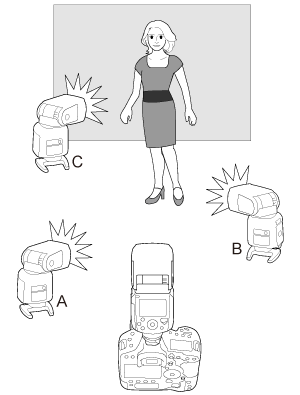
A ve B patlama grupları ayarlandıktan sonra, C grubunu ekleyerek birden fazla Speedlite ile flaş patlatabilirsiniz, Grup Kontrolü konusuna bakın.
C Grubu, konuların arkasındaki arka plandaki gölgeleri kaldırmak istediğinizde kullanışlıdır.
-
Doğrudan joystick tuşuna basın.
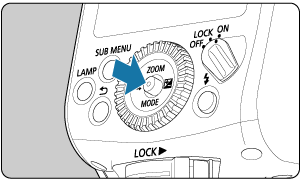
-
(1) ile gösterilen öğeyi seçin.
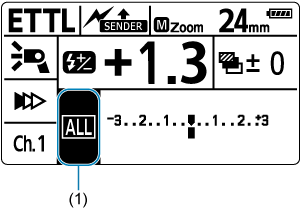
- Joystick tuşuna dikey/yatay yönde basarak veya
kadranını çevirerek öğeyi seçin, sonra doğrudan joystick tuşuna basın.
- Joystick tuşuna dikey/yatay yönde basarak veya
-
ayarı yapın.
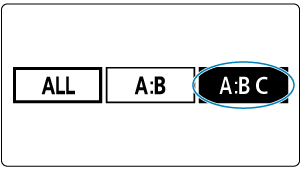
- Joystick tuşuna yatay yönde basarak veya
kadranını çevirerek
seçimi yapın, sonra doğrudan joystick tuşuna basın.
- Joystick tuşuna yatay yönde basarak veya
-
Speedlite'ları A, B veya C patlama grubuna ekleyin ve konumlandırın.
- Tüm alıcı ünitelerin gönderici ünite ile aynı aktarım kanalına ayarlanıp ayarlanmadığını kontrol edin.
- A, B veya C grubu için alıcıları ayarlayın ve konumlandırın.
-
Aktarım kanalını kontrol edin.
-
A:B flaş oranını ayarlayın.
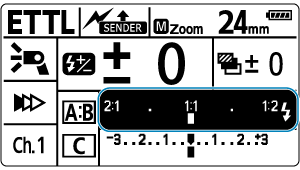
- Şekilde gösterilen öğeyi seçmek için doğrudan joystick tuşuna basın.
- A:B flaş oranını ayarlamak için joystick tuşuna yatay yönde basın veya
kadranını çevirin, sonra doğrudan joystick tuşuna basın.
-
Patlama grubu C için flaş poz telafi miktarını ayarlayın.
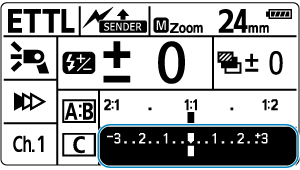
- Şekilde gösterilen öğeyi seçmek için doğrudan joystick tuşuna basın.
- Telafi miktarını ayarlamak için joystick tuşuna yatay yönde basın veya
kadranını çevirin, sonra doğrudan joystick tuşuna basın.
-
Flaş şarjının bittiğini onaylayın.
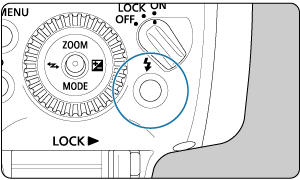
- Gönderici ünitenin flaş hazır lambasının yandığından emin olun.
- Alıcı ünitenin tam şarjlı olduğundan emin olun.
-
İşlemi kontrol edin.
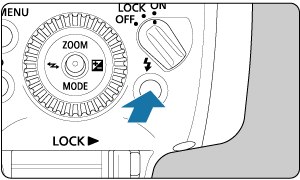
- Gönderici ünitenin deneme flaşı tuşuna basın.
- Patlama grupları A, B ve C patlar. Patlamazsa, işlem yapılabilecek aralıkta yerleştirildiğinden emin olun.
-
Fotoğrafı çekin.
- Makineyi yapılandırdıktan sonra normal flaşlı fotoğrafçılıkta olduğu gibi çekim yapın.
Önlem
- Üç A, B ve C grubunu patlatmak için
konumuna ayarlayın. C Grubu, Speedlite’lar
ayarında olduğunda patlamaz.
- Patlama grubu C'deki ünitelerin doğrudan konulara bakması aşırı pozlamaya neden olabilir.
- E-TTL otomatik flaş destekli bazı EOS video kameralarında, flaş oranı ayarıyla kablosuz çoklu flaşlı çekim yapamazsınız.
- Alıcı üniteye yakın floresan ışığı veya bir bilgisayar monitörü varsa, ışık kaynakları alıcı ünitenin arızalanmasına ve hatalı patlamasına neden olabilir.
Not
- Fotoğraf makinesinin alan derinliği önizleme tuşuna basarak modelleme flaşını patlatabilirsiniz ().
- Otomatik kapanma modunda olan bir alıcıyı açmak için gönderici deneme flaşı tuşuna basın.
- Bir fotoğraf makinesinin flaş zamanlayıcısı veya benzer işlevleri etkin durumdayken deneme flaşı patlatılamaz.